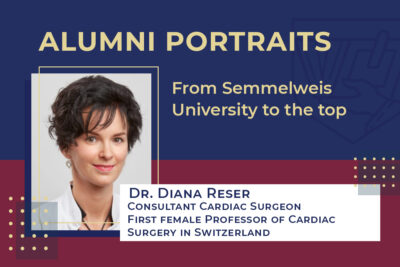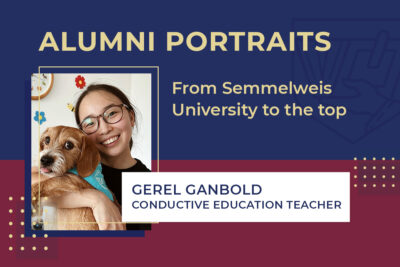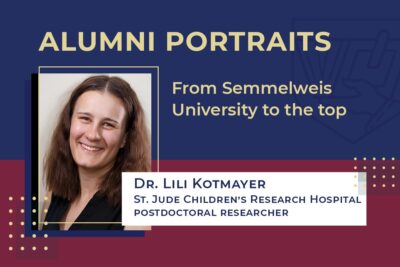In the next part of our Alumni Interview series, we talked to Dr. János Kóka, a former student of Semmelweis University, about his considerable achievements during his long career in politics and business.
Please tell us about your university years.
Between 1990 and 1996 I attended the Faculty of Medicine of Semmelweis University (then SOTE). Besides the university, I worked from the first year; four years at the Traumatology Department of the János Hospital, two years at the National Institute of Clinical Neurosciences in “Amerikai út” (then OITI), and I also got a taste of ambulance work. Our year was really productive, it gave the medical community great experts such as Péter Sótonyi, who became one of the most important leaders in Hungarian vascular surgery, János Bálega, an internationally renowned gynecological oncologist who is now heading a department in Birmingham, and Péter Túri, the creator of modern Hungarian state air ambulance services and founder of Trustair, the largest regional air ambulance company. Furthermore, as a demonstrator, I was able to support the work of Balázs Járay, a leading figure in cytology and histology, and founder of Medserv, in the pathology clinic. I was also very fortunate to have known and been able to learn from legendary professors such as János Szentágothai, Tivadar and Zsolt Tulassay, and Zoltán Papp.
Why did you decide to start your higher education at the Faculty of Medicine of Semmelweis University?
Despite not having a medical background, I have been drawn to medicine since I was a small child. When I was nine years old, Professor Tibor Vízkelety performed a varicose, derotational femoral osteotomy on me at the Clinic of Orthopedic Surgery for a hip deformity. I spent many months in hospital afterwards, and it was there that I decided to become a doctor.
Do you have a role model? If so, who and why?
That’s him, Tibor Vízkelety. An imprinting effect, you might say, but as an adult I see him as the ideal blend of humaneness, surgical knowledge, scientific expertise, leadership ability and teaching flair. He worked as a pediatric orthopedic surgeon for more than 50 years.
Please tell us about your university years. Which year was the most memorable for you?
The second, as perhaps for everyone. The year of the comprehensive exam in anatomy. In the second half of the university I also started working outside the health sector already.
Do you have any memories that you still look back on fondly?
I remember the seminars of the study periods, the success of the sweaty comprehensive exams, the cohesive community of our year group, the Saturday night parties, as well as the gloomy yet sublime atmosphere of the university clinics. I’m glad I could come here to study.
During your university years, you started your business career. How did you get involved in the business/IT world? How did you manage it all as a medical student?
I helped out at Elender, probably the most exciting IT company in the country at the time, initially as a summer worker, but then it became my “full-time job” alongside university. That was the time when the internet was introduced in Hungary. The digital world also marked a new direction for my life. At first, I split my days between the company and the university, and worked one or two nights a week in the emergency surgery. When I was in my fifth year, the owner of Elender put me in charge of the internet service, so as a graduate student I could choose between a career in medicine and running an IT company, which by then had 100 employees. I chose the latter, leaving my profession – at least for a while.
After university, you had a variety of jobs. Can you tell us about them?
After graduation, I worked for Elender for eight years (1996–2004), then we sold the company. Afterwards I dabbled in the world of politics, between 2004 and 2010 as the Minister of Economy and Transport, then as a Member of Parliament, leader of the liberal party (SZDSZ) and its parliamentary group leader. I was also the Minister of Health for just two weeks: in addition to the Ministry of Economy, I was appointed by the Prime Minister to lead the then Ministry of Health during the interregnum following the resignation of Minister Lajos Molnár and prior to the inauguration of Minister Ágnes Horváth. After leaving politics, I returned to business: until 2018 I worked mainly for IT companies, and today I strengthen the team of Doktor24, one of Hungary’s leading healthcare providers. Not as a doctor, of course.
The predecessor of Doktor24 was founded in 2004 by the three of us: my wife Ágnes Ruzsovics, a medical doctor, my friend and business partner, Róbert Lancz, who has built it into a fantastic company over the past 20 years, and me. Today we employ 1,200 people, run 10 hospitals and clinics, serve nearly half a million clients in 12 operating theatres and 200 surgeries. In addition to my work, I am a member of various international organizations and bodies. I used to travel a lot, but now that I’m over 50 I want to spend more and more time with my family. My wife and I have a son, and together with the children of our previous marriages, we have 5 children (aged 7, 13, 14, 14 and 28).
What have these opportunities given you?
High speed, versatile experience, international outlook and a network of contacts.
What do you owe to Semmelweis University?
In addition to knowledge that is now well outdated, a human being-centered approach that is very useful not only as a doctor but also in other areas of life. It can be combined with the market-oriented vision that is the hallmark of business. Especially, in case of a healthcare provider, it is fortunate to have these two approaches together.
How did you spend your free time during and after your university years?
I’ve sailed, skied, travelled a lot, and all of this, besides recreation, was mainly about the company. In every aspect of my life, both at work and in my leisure time, I have met people from whom I have learned a lot.
What advice would you give to current Semmelweis students?
From time to time I am invited to Semmelweis University for an event, so I can see up close how my alma mater has developed. My wish is that we should live the experience of attending one of the best medical universities in the world! A university where, in addition to the cultivation of science, we have unique opportunities for practice and “sharp” patient contact. It costs a lot to train doctors, and it gives the students a very special knowledge. My advice to today’s students is to make the most of those years at university; more than I did, for example, when I was working while completing my studies.
Alumni Directorate
Translated by Veronika Jávor-Szelid


